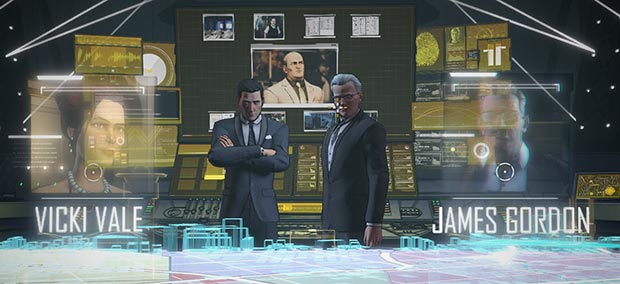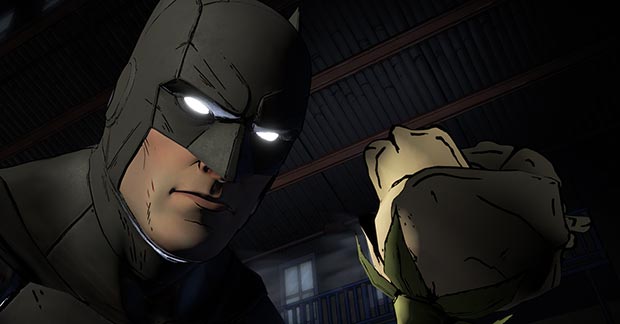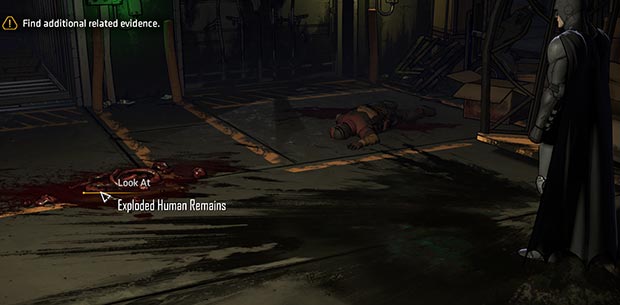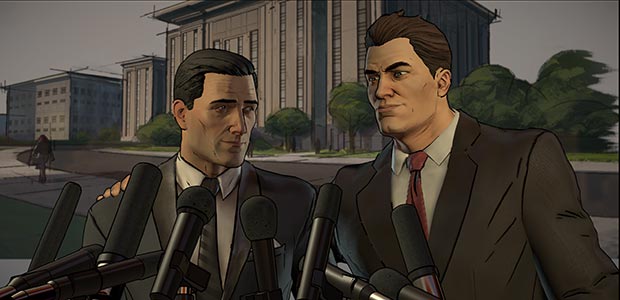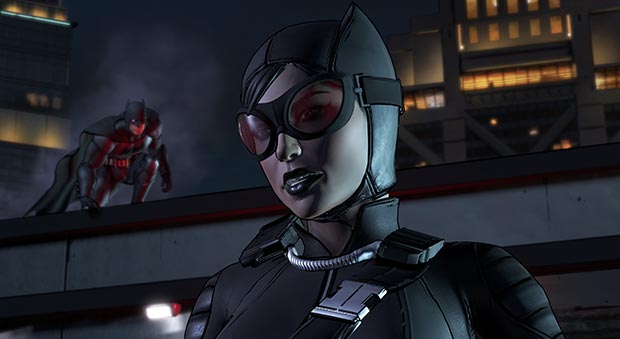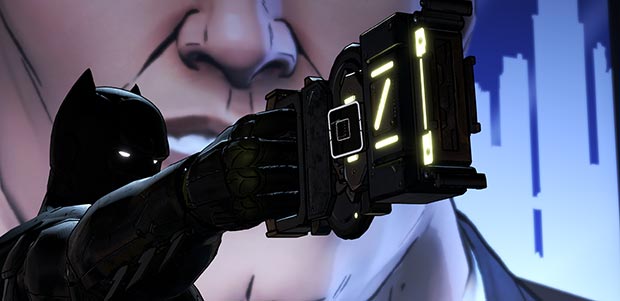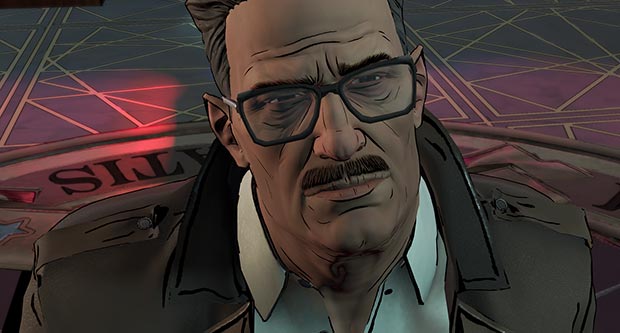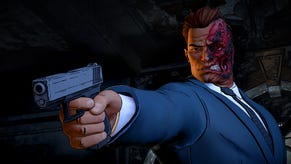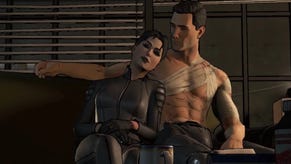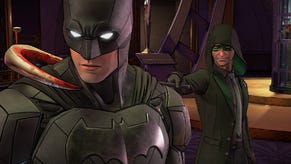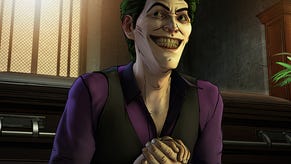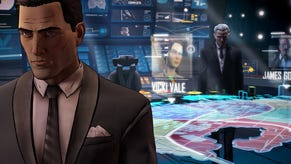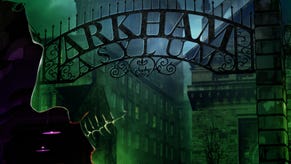Wot I Think: Batman - The Telltale Series Episode 1
Wait, did something happen to Bruce Wayne's parents?
I don’t know about you, but I’ve often wondered about just what it was that made Bruce Wayne become Batman. If only there was some sort of insight to be had into whatever tragic event caused Wayne to wage a war on crime. 77 years of Batman, thousands of comics, hundreds of cartoons, a dozen films and still his origin is entirely mysterious to us. If only there was some way to find out a) what makes Wayne hate crime so and b) how he feels about it.
Thank you, Batman - The Telltale Series, for finally putting us out of our misery.
You’ll never guess what, but it turns out the Bruce’s parents were shot and killed by a mugger! I know! And Bruce was but a child when it happened! And he saw it all! And it happened when they were on the way home from seeing Zorro at the cinema! Gosh, it all makes sense at last.
In fairness, Telltale’s conversation’n’quicktime Dark Knight tale isn’t an origin story per se, and nor we do we get a straight-up enactment of the Waynes’ death, but it's shown obliquely several times and mentioned more than I can count. There is a final act reason for this slow-motion refresher course, but it is difficult to believe that the vast majority of this game’s audience would have been unaware of these long-held core Bat-facts, and certainly I found the restatement frustrating.
In all respects, this is something of a Year One story all over again, rather than A Day In The Life Of The Bat-Like Man, and as such is extremely concerned with old chestnuts such as why Bruce puts himself through physical and psychological hell by doing the ol’ midnight street-cleaning fandango, that Gotham City’s politics is interwoven with organised crime, and that an array of familiar larger-than-life figures are on a date with supervillainous destiny. Harvey Dent is a crusading district attorney, Oswald Cobblepot is down-at-heel former nobility with a chip on his shoulder, and some unseen tyke is up to funny business with nerve gas. Glowing neon signposts to anyone with even an only rudimentary knowledge of Batlore, in other words.
Whether these figures will indeed embrace their infamous mantles during the course of this episodic series remains to be seen, but going on the first instalment’s excessive heel-dragging, I wouldn’t be surprised if at least a few of the rogues’ origins are being put off until a hoped-for later season. Similarly, Commissioner Gordon has only just become aware of Batman, our hero has his first-ever meeting with Catwoman during the game’s introductory act, and mob boss Carmine Falcone still has an iron grip around Gotham’s neck.
Age-old links are being forged once again, known beats are yours to drop, and while this gives Telltale a clean slate from which to puppet-master its characters, I needed it to skip to the end and start the party in earnest. I found myself craving a more established Batworld with everyone in their right places and no setup needed, and with a brand new villainy concept as opposed to the hoary old “corruption in city hall” plot here (which is also a touch too similar to The Wolf Among Us). There is a final-act twist that drags things in a fresher direction, although it’s still one that will be familiar to relatively recent Batman comic readers.
Telltale’s Batman has a certain amount in common with the Gotham series, in terms of being a somewhat remixed, everything-is-connected fresh start – but very much not in terms of being absolutely crackerjack nuts. Tonally, this is more the sombre angst of Nolan than anything else, but slower, broader, more earnest, and indeed clumsier in terms of pacing.
I very much admire its intentions in terms of giving us more glimpses of how Bruce Wayne’s life works in between late-night beatings, and certainly his walking the line between maintaining his devil-may-care face and publicly refusing to work with dodgy characters plays to the moral deliberation strengths of the Telltale formula. The stakes feel high, and the sense that there will be consequences to ticking off someone is there, whether or not past Telltale adventures have essentially railroaded decisions into the same outcomes come the final chapter. The same may well happen again, but hey, stop and smell the roses and all that.
There is so much wheel-spinning though, particularly in long-winded chats with a distractingly Hulk-like Harvey Dent and age-old ‘Alfred says Bruce is pushing himself too much’ sequences. As I say, there are also too many scenes of Bruce feeling sad about his parents. I get that this wants to be a Bruce story as much as – if not more than – a Batman one, but I worry that it just hasn’t found anything new to say about him.
Meanwhile, Telltale’s Oswald Cobblepot is another grating entry into the rich and storied history of American actors giving The Penguin a woefully unconvincing English accent. For God’s sakes, there’s no need for this. He lives in Gotham, just make him American.
On top of that, Telltale’s well-used Walking Dead engine and art style, though prettified, increasingly has a homogeneity problem. I felt almost disorientated on occasion – wait, was I playing Batman or Game Of Thrones or Wolf Among Us or Walking Dead? Had I always been playing this one game? Those fake comic ink lines, those exaggerated expressions – too familiar, too contrived now. When the camera pulls out and the lines and the over-expressive eyes aren’t visible, Batman becomes far more beautiful, with a more noire and less fantastical take on Gotham than the Arkham games’.
That aside, one couldn’t say that this feels especially ‘Batmany’ on an aesthetic level – it’s an unavoidably a Telltale game with Batman characters, and the faux-outlines particularly verge on self-parody at times. The exception to the homogeneous rule is an attempt to make some characters more grotesque in order, I am guessing, both to look more distinct from the Telltale norm and to play to the twistedness of the Batman fantasy.
Trouble is the results of this approach mean we get a Commissioner Gordon who looks on the verge of a ‘roid rage and a revered district attorney who we are supposed to believe is unprecedentedly crusading despite very obviously spending 23 hours a day in the gym. This grotesquery would work if there was any sense of playfulness to the dialogue, but sadly it’s either entirely earnest or has a character effectively mugging to camera. For a game that’s interested in the nuances of Wayne’s identity, it doesn’t have much in the way of subtlety.
There are a few moments where the Wayne side of the game lands its punches, though. There’s pleasure to be had in deciding what kind of mask the Bat wears over his face – jocular and amiable, defensive and combative, crusading and emotional. Which best serves the Bat? Which best opens up opportunity for crime-fighting, which is most likely to cast suspicion upon Wayne’s true proclivities? Frankly the game’s too interested in drawn-out exposition to get deep into investigating that stuff, but it’s a welcome peek into the roleplaying Batman must do in order to maintain his cover (and his funding), and I hope later episodes do more with it.
As for the Batman aspect of the game – yeah, stronger, though you have to take the essential quicktime eventiness of it on the chin. This is not an action game by any stretch of the imagination, but it includes multiple action scenes – has to, being a Batman tale. Its approach is to try and make its fights cinematic rather than adrenal. Realistically, you’re highly unlikely to bungle any of the Simon Says prompts, and wisely it tries to make the effects cool rather than the window of response more limited.
There’s much in the way of crunching skulls and inhumanly fast dodges, and generally of Batman being one mental move ahead of his foes at all times. I.e. goons get schooled, and you get to feel like Batman. It’s not a patch on the superhuman flow of a well-executed Arkham series beatdown, but it’s a far better feeling than getting your Kevlar-clad arse handed to you because you mistimed a couple of hits or your thumbs got tired. QTEs are a troublesome mechanic at the best of times, but this does work hard to make them feel natural rather than hatefully arbitrary.
This also has a nice line in choosing what kind of Batman you’re going to be – one who terrifies or one who brutalises. Again, it’s perhaps too similar to the approach used in Wolf Among Us, but there is both a sense of roleplaying and a sense of consequence to it. Are you Keatonman or are you Battfleck? And how will your treatment of criminals look in the eyes of the police and public?
God only knows how it will shake out over the series, but it feels like a meaningful reflection of the modern Batman dilemma: is he saving the city or making it worse? Sadly, it’s undermined somewhat when this game’s particularly insufferable incarnation of the Nagging Alfred archetype chastises you for “beating a man half to death” even when you very deliberately didn’t. (I did wonder if this was a bug, in fact).
Crime scene investigation holds promise too, revolving more around literally drawing links between evidence rather than the Arkham series’ scanning-based approach. Sadly, and again like Wolf Among Us, only an honest-to-god idiot could screw the investigations up – getting a ‘World’s Greatest Detective’ achievement for doing the entirely obvious felt patronising – but it’s nonetheless a decent in-road to a core piece of the Batman fantasy. Hope it’s made more elaborate later, although going on Telltale’s maximum-accessibility form, this is unlikely.
All-told, the pace and the sense of mystery steps up in the game’s final third, and Batman felt less blighted by the tedium that characterises its bulk. With setup of oh-so-familiar things out the way and an actual threat now posed, future episodes at least have the opportunity to hit harder than this sluggish intro does.
I can’t shake the feeling, though, that, more than ever, I am a mere passenger on a story that’s telling itself – though later episodes may disprove that. Other than being top and tailed by QTE action, I felt I was sitting through over-long exposition of the already known, reaching a more interesting conclusion/cliffhanger that could easily and more effectively been built to in half the time.
Some foundations are laid that might make for stronger follow-ups, but as it stands Batman does not have the emotional punch of The Walking Dead’s better episodes, the intriguing oddness of Wolf Among Us or the shockingly heavy consequences of Game Of Thrones, and worst of all it makes cracks in Telltale’s aged wall highly obvious. I should not feel bored in a Batman game, but bored is what I felt for most of it. Bring back Joel Schumacher, all is forgiven.
Batman - A Telltale Series episode one is out now.


